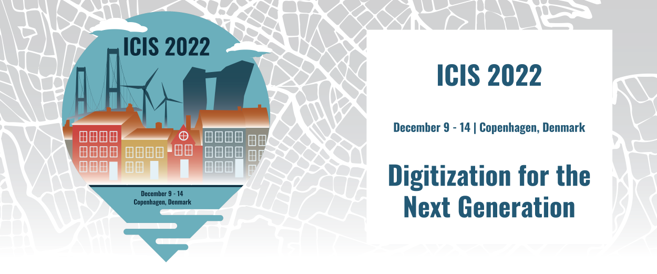Our track is concerned with research on the design and evaluation of sociotechnical AI-based systems that achieve multi-sided outcomes and are meaningful to the businesses and/or society as well as the use and consequences of sociotechnical AI systems. Particularly, we welcome studies that examine impactful “AI design principles” and research that yields new principles for the design and evaluation of AI tools. This also includes studies that take on a hybridization approach and present designs of interesting human-AI hybrids in different contexts. We seek studies that are theoretical, empirical, or, technical, quantitative or qualitative, as long as the research yields impactful new insights. By “impactful,” we mean that the design principles should pivot from the existing research, theory, and practice; specifically, authors will need to demonstrate through their understanding of the existing opus, how their research builds on current knowledge on the topic, and not simply state that fact. By “multi-sided outcomes,” we mean an effective AI-based tool or system which achieves value not just for the developer or the corporation using it on consumers, employees or contributors but for those other people as well. The value should be in ways that go far beyond simple recommendations for movie choices, but improve people’s lives in fundamental ways (e.g., closing the income inequality gap, dampening systemic racial biases, reducing information silos, engaging with the challenges of global warming, improving the safety of seniors’ homes, etc.). By “sociotechnical AI,” we mean that studies should seek to open and provide insights into the black box of the user, the ecosystem of use and development, and the technology around it. For example, discussions of the AI tools should include the data and algorithms they are built on, how users are enticed into engaging with these tools, and what is the ecosystem that institutionalizes the tool-usage patterns that harm or foster the multi-sided outcomes. Through our interest in human-AI hybrids, we are also seeking studies that not only focus on the design of AI-based tools for the user but shed more light on how humans and AI can work collaboratively on a task. We invite studies that a) work on all levels of analysis, from the individual up to the societal, and b) research that unpacks not only the black box “of the user, the ecosystem of use and development, and the tool” but also of the interactions between user and tool, which may be at a more granular level. We also welcome submissions providing in-depth cases of implementation and use of AI in specific organizations and identifying its (unintended) consequences. We also ask that studies clearly delineate AI and AI-based tools from traditional information technologies and make a case for why AI (and its surrounding context) should be viewed differently.
Track Co-Chairs Michael Chau, Ph.D., The University of Hong Kong Hila Lifshitz-Assaf, Ph.D., New York University(NYU) Alexander Maedche, Ph.D., Karlsruhe Institute of Technology (KIT)Subscribe to RSS Feed (Opens in New Window)
| 2022 | ||
| Monday, December 12th | ||
| 12:00 AM |
A Strategic Analysis of Algorithm Manipulation: a Lending Game perspective Jiali ZHOU, HKUST 12:00 AM |
|
|---|---|---|
| 12:00 AM |
Algorithmic Decision-Making Systems: A Conceptualization and Agenda for Green IS Research Antoine Grenier Ouimet, Smith School of Business at Queen's University 12:00 AM |
|
| 12:00 AM |
An Intelligent Customization Framework for Tourist Trip Design Problems Le Wang, Xi’an Jiaotong University 12:00 AM |
|
| 12:00 AM |
Benjamin van Giffen, University of St. Gallen 12:00 AM |
|
| 12:00 AM |
Conceptual Foundations on Debiasing for Machine Learning-Based Software Anuschka Schmitt, University of St. Gallen 12:00 AM |
|
| 12:00 AM |
Xiyang Hu, Carnegie Mellon University 12:00 AM |
|
| 12:00 AM |
Sagarika Suresh THIMMANAYAKANAPALYA, university at buffalo 12:00 AM |
|
| 12:00 AM |
Fair Algorithms in Organizations: A Performative-Sensemaking Model Manos Gkeredakis, University of Navarra 12:00 AM |
|
| 12:00 AM |
Future imperfect: How AI developers imagine the future Emmanuelle Vaast, McGill University 12:00 AM |
|
| 12:00 AM |
Leveraging an Ecosystem for the Development of AI Applications Xuetao Wang, The University of Sydney 12:00 AM |
|
| 12:00 AM |
Machine Learning for ARUP: Time to Redefine the Ground Truth Sergey Stroppiana Tabankov, University of Warwick 12:00 AM |
|
| 12:00 AM |
Managing Organizational Identity Challenges Caused By AI Implementation: The Role Of AI Principles Alexandra Haimerl, University of Passau 12:00 AM |
|
| 12:00 AM |
Dominik Stoffels, University of Passau 12:00 AM |
|
| 12:00 AM |
Ralf Plattfaut, Fachhochschule Südwestfalen 12:00 AM |
|
| 12:00 AM |
Restoring Justice: The Moderating Role of AI Agent in Consumers’ Reactions to Service Recovery Yue Cheng, Peking University 12:00 AM |
|
| 12:00 AM |
Review of Research on Human Trust in Artificial Intelligence Yonggang Li, Information Systems and Analytics, National University of Singapore 12:00 AM |
|
| 12:00 AM |
Saskia Haug, Karlsruhe Institute of Technology (KIT) 12:00 AM |
|
| 12:00 AM |
The Role of Artificial Intelligence for Business Value Maggie C. M. Lee, Swinburne University of Technology 12:00 AM |
|


